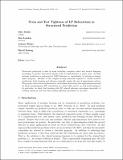Train and test tightness of LP relaxations in structured prediction
Author(s)
Meshi, O; London, B; Weller, A; Sontag, D
DownloadPublished version (634.7Kb)
Publisher with Creative Commons License
Publisher with Creative Commons License
Creative Commons Attribution
Terms of use
Metadata
Show full item recordAbstract
© 2019 Ofer Meshi, Ben London, Adrian Weller, and David Sontag. Structured prediction is used in areas including computer vision and natural language processing to predict structured outputs such as segmentations or parse trees. In these settings, prediction is performed by MAP inference or, equivalently, by solving an integer linear program. Because of the complex scoring functions required to obtain accurate predictions, both learning and inference typically require the use of approximate solvers. We propose a theoretical explanation for the striking observation that approximations based on linear programming (LP) relaxations are often tight (exact) on real-world instances. In particular, we show that learning with LP relaxed inference encourages integrality of training instances, and that this training tightness generalizes to test data.
Date issued
2019-02-01Department
Massachusetts Institute of Technology. Computer Science and Artificial Intelligence LaboratoryJournal
Journal of Machine Learning Research